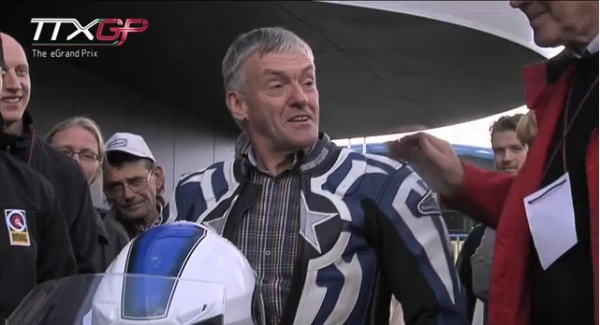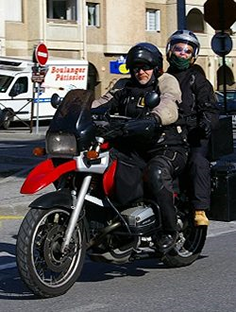 The MEP Rapporteur Wim van de Camp has commented after intensive informal talks between Parliament’s negotiators and the Cyprus Presidency, “I am happy with the agreement reached today with the Council”.
The MEP Rapporteur Wim van de Camp has commented after intensive informal talks between Parliament’s negotiators and the Cyprus Presidency, “I am happy with the agreement reached today with the Council”.
His words are included in a press release from the European Parliament (EP) in which Mr van de Camp, (MEP from the Netherlands) continues, “Of course safe motor cycling is largely the responsibility of the driver, but I think there is still some result to be gained with the technical aspects of the vehicle”. We can only assume that this refers to some of the technical details being sorted through the European Commission stakeholder group, the MCWG Motorcycle Working Group.
The press release states that, “MEPs closed a deal with Council on safer, greener motorbikes”, with the committee on the Internal Market and Consumer Protection (IMCO), “provisionally agreed by MEPs and Council negotiators on Friday” (29thSeptember).
We at Right To Ride have reported extensively that the new regulation lays down approval and market surveillance rules for all L-category vehicles, which according to the EP press release means that across the EU this includes, “about 30 million mopeds, scooters, motorbikes, all-terrain vehicles and quads.”
As these vehicles account for 16% of accident deaths on Europe’s roads, even though they make up only 2% of road traffic, MEPs inserted more stringent safety requirements for them, as well as tougher emission targets.
The press release under the title of “Safer” reports that, “MEPs agreed that under the new rules, anti-lock braking systems (ABS) would have to be fitted to all “bigger” motorbikes (i.e. those over 125 cc), while ABS or combined brake systems (CBS) could be fitted to smaller ones (under 125 cc), including scooters.
In addition we have ensured that after 4 years the Commission should present a cost effectiveness analysis, with recommendations as to whether the rules should be revised.
We also introduced new measures to prevent tampering of powertrains to make vehicles go faster”, explained Wim van de Camp.
This statement however does not explain the fact that the so called “tampering” measures refer to the smaller motorcycles and mopeds i.e. those that are already restricted as agreed by the IMCO Committee, Council and the Commission.
On the green issue the press release claims that, “L-category vehicles emit disproportionally high levels of pollutants,” and that MEPs, “successfully proposed to bring them (pollutants) down by extending the Euro 3 standards to mopeds from 1 January 2016.
For heavy motorcycles, the more stringent Euro 4 standards would apply from 2016 and Euro 5 limits from 2020.”
However according to van de Camp, “again the Commission will have to carry out a comprehensive environmental impact study by 1 January 2016 to evaluate the air quality and share of pollutants emitted by L-category vehicles.”
The next steps according to the press release indicate that, “The provisionally agreed text still needs to be formally endorsed by Council and Parliament. Then the deal will be put to an Internal Market Committee vote at the next meeting in October and then a plenary one in November 2.”
Right To Ride – Salient Issues
However, chatting to the Commission representative at the IFZ Conferences in Germany (1st October) – he’s the chap responsible for the proposal on the approval and market surveillance of 2 or 3 wheeled vehicles and quadricycles, he informed Right To Ride that the proposal should be voted on the 19th November – with the caveat that the translations all have to be completed so it might slide to December.
To summarise more salient issues regarding Anti-tampering measures:
Since there was never any intention to restrict rider-modifications and the replacement of parts with aftermarket parts, the agreed amendments are about restricting anti-tampering measures to manufacturer obligations which apply before type approval is granted.
These are designed to ensure key safety or emissions requirements cannot easily be tampered with by unscrupulous individuals. Motorcycle enthusiasts and riders with special needs will continue to be able to modify their vehicles and the aftermarket part sales and the repair and maintenance sectors will not be affected.
Furthermore, higher and medium powered motorcycles are entirely excluded from the application of these measures and the anti-tampering measures required of manufacturers only cover low performance motorbikes and mopeds.
Any proposals for policing or compliance checking and further testing in this Regulation have been abandoned.
To reiterate what we at Right To Ride wrote in June (2012), which is what we believe interests the vast majority of motorcyclists:
“The Parliament has agreed to Council’s position on not mandating ABS on scooters (50 to 125cc), it has also agreed with the Council on limiting the anti-tampering provisions to lesser powered motorcycles only and making them manufacturer obligations only, so categories L3eA2 and L3eA3 (high and medium performance bikes) are entirely excluded from the anti-tampering measures. The Parliament has also agreed to not having detailed EU rules on Individual Approval in this Regulation, with this left to national rules”.
Information
Original Source Parliamentary/IMCO Press Release: Click Here
Read and Comment on Right To Ride EU – Click Here


